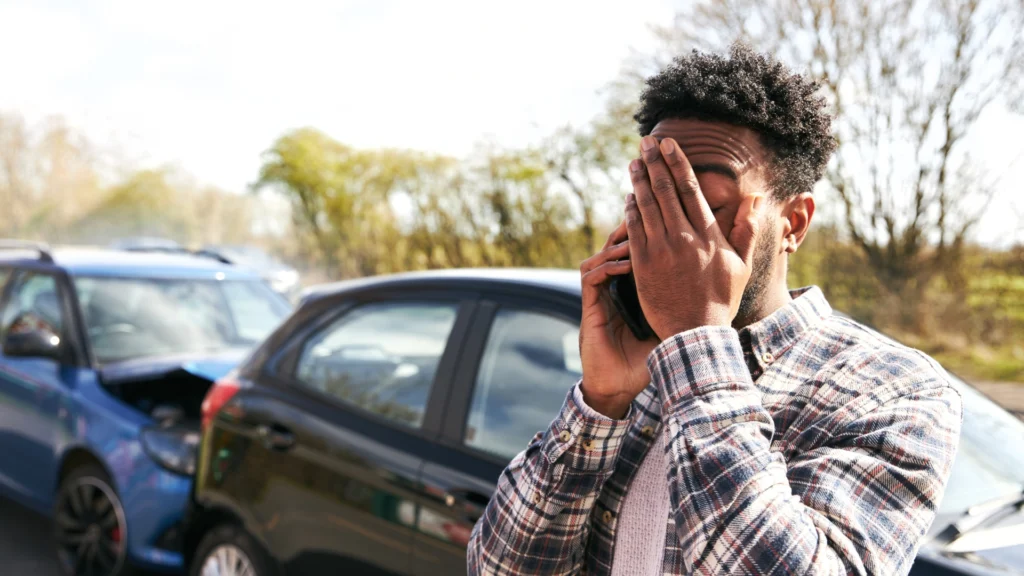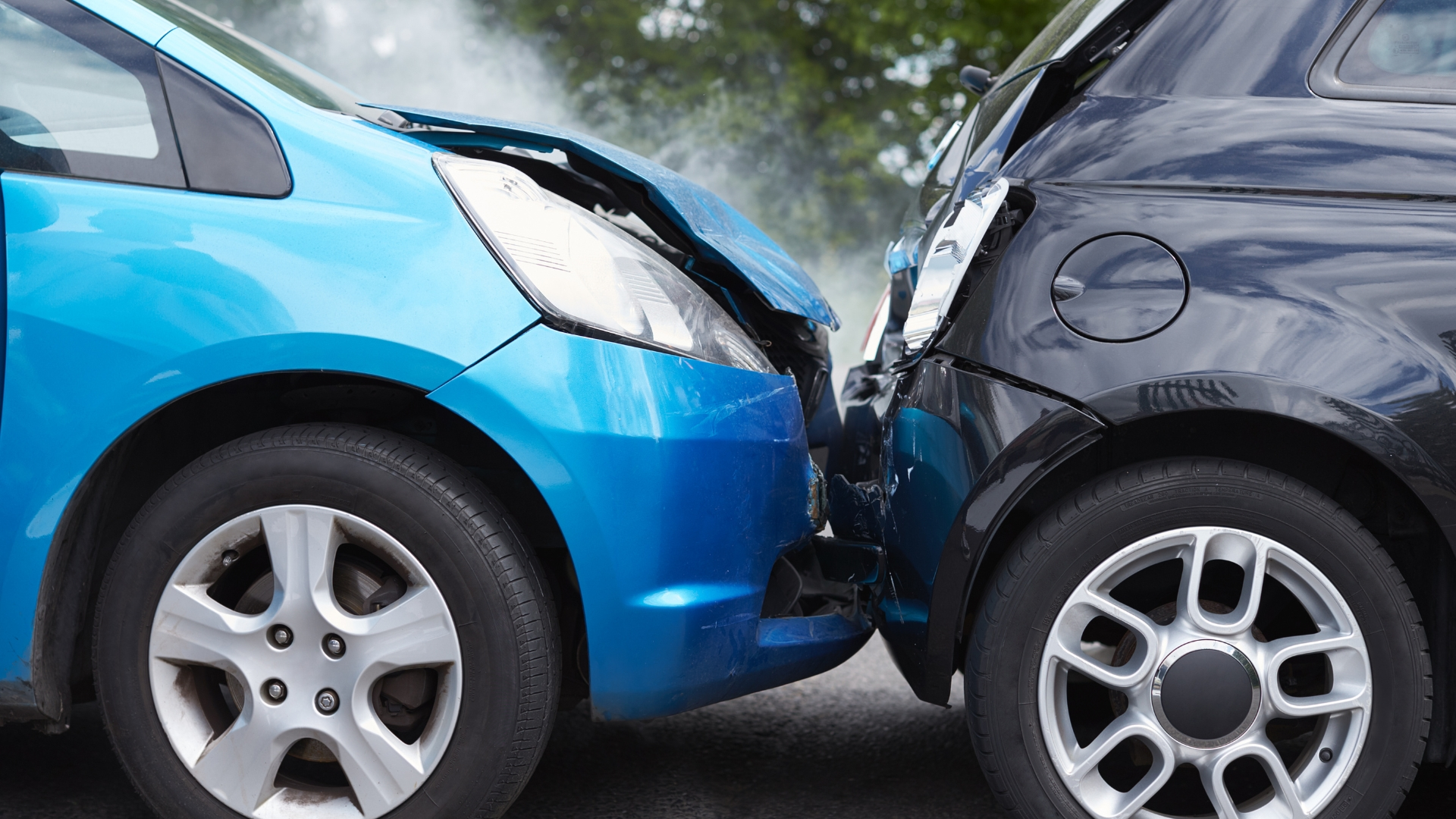You’re stopped at a red light then suddenly, you’re jolted forward. Someone’s rear-ended you. Now what? If someone rear ends you whose insurance do you call? It’s a question that leaves many drivers unsure in an already stressful moment. This quick guide clears up the confusion. You’ll learn who’s responsible, how to handle rear-end insurance claims, and which steps to take right away so you don’t miss out on coverage.
Key Takeaways
- If you are rear-ended, the at-fault driver’s insurance should cover the damage. However, if the other driver is uninsured or underinsured, you may need to involve your own insurance company.
- After a rear-end collision, immediately contact the at-fault driver’s insurance. You should also reach out to your own insurer to initiate a claim, especially if there’s any complication or dispute about fault.
- To file a rear-end insurance claim, make sure you have the relevant insurance number and all necessary documents, such as a police report, photos of the damage, and witness statements.
- Keep detailed records of everything related to the accident communications with insurance companies, repairs, and any legal actions. This will help prevent delays in your claim and ensure you receive the compensation you’re entitled to.
- If the other party’s insurance refuses to cover the damages, consider using your own insurance to file a claim or pursue legal action. Understanding your rights can save time and frustration during the claims process.
Table of Contents
Understanding Insurance Responsibility
If someone rear ends you whose insurance do you call? It’s one of the first and most urgent questions drivers ask after an accident. In most rear-end collisions, the answer depends on fault and your state’s insurance laws. Here’s how to determine liability and who covers the damage under rear ended car insurance policies.
This video explores scenarios where liability in rear-end accidents may be contested and how to handle such disputes:
Who is Responsible for the Accident?
In a rear-end collision, fault is often presumed but there are exceptions that can affect your claim.
- Explaining Fault in a Rear-End Collision
The driver who rear ends someone is usually at fault because the law requires maintaining a safe following distance. That said, sudden stops or improper signaling by the lead driver can complicate the situation and shift part of the responsibility. In such cases, understanding rear end someone insurance implications is key when filing a claim. - State Laws on Fault (Comparative vs. Contributory Fault)
Fault rules differ by state. In comparative fault states, you may still recover damages even if you’re partly at fault, while contributory fault states can deny compensation for even minor negligence. These rules affect how rear end insurance claims are handled and which insurance company ultimately pays. - Who is Typically at Fault in a Rear-End Accident?
Generally, the rear driver is liable, especially if they were speeding, distracted, or failed to brake in time. But insurance companies will look closely at the circumstances. Knowing the rear end insurance number of the other party is essential when initiating a claim. Whether you’re calling your insurer or theirs, having accurate details will make the process smoother.
So, if someone rear ends you, whose insurance do you call? Typically, you file a claim with the at-fault driver’s insurer but your own rear ended car insurance may still play a role depending on coverage, injuries, and whether the other party is uninsured
Insurance Claims After a Rear-End Collision
If someone rear ends you whose insurance do you call? It’s one of the most important questions after a crash and getting the answer right can make or break your claim. Understanding your next steps with rear-ended car insurance coverage can help ensure your expenses are handled properly and on time. Here’s what you need to know.
This video explains the steps to take immediately after being rear-ended, including which insurance company to contact.:
Which Insurance Do You Call When Rear-Ended?
- Coverage from the At-Fault Driver’s Insurance
In most rear end insurance claims, the at-fault driver’s insurer is your first point of contact. Their liability coverage should pay for your car repairs and any injuries you’ve sustained. When filing, make sure to obtain the rear end insurance number from their policy and report the incident promptly. - When to Contact Your Own Insurance Company
If the other driver is uninsured, underinsured, or won’t cooperate, you may need to turn to your own insurer. If you have collision or uninsured motorist coverage, your policy can kick in to cover damages. Just keep in mind that using your rear ended car insurance could impact your future premiums. - What to Do if the At-Fault Driver Is Uninsured or Underinsured
Uninsured drivers complicate things. If the other driver lacks coverage or doesn’t have enough you’ll need to lean on your uninsured/underinsured motorist protection, if available. If you don’t carry this type of policy, your options may include paying out-of-pocket or pursuing legal action.
Rear-End Insurance Claims Process
- Steps to File a Rear-End Insurance Claim
First, determine whether you’ll be filing through your insurance or the other driver’s. In either case, act quickly. Provide detailed information about the crash and submit any required documents. If you’re the one who rear end someone, insurance companies will assess fault based on police reports and other evidence. - What Information You Need (Witnesses, Police Report, Photos, etc.)
When initiating a claim, have the rear end insurance number ready. Also collect the police report, accident scene photos, and contact details for any witnesses. These details strengthen your claim and reduce delays. - Time Limits for Filing a Claim
Each insurer has its own timeline for filing rear end insurance claims. Generally, you’ll need to notify them within days of the accident. Miss that window, and your claim might be denied.
An attorney discusses common pitfalls in rear-end accident claims and offers strategies to maximize your settlement:
Navigating rear-ended car insurance after a collision doesn’t have to be overwhelming. If someone rear ends you whose insurance do you call? Start with the other driver’s unless they’re uninsured or uncooperative. In that case, your own coverage may be the safety net. Either way, keeping clear records and acting fast will make the process much smoother.
How to Protect Yourself in Case of a Rear-End Collision
If someone rear ends you whose insurance do you call? It’s one of the most important questions to answer after a collision. The decisions you make in the minutes and days that follow can impact how smoothly your rear end insurance claims are processed. Here’s how to protect yourself and your financial interests.
Maintaining Proper Documentation
- Why Keeping Thorough Records Is Important for Your Claim
Accurate records are essential for supporting your rear end insurance claims. From police reports to repair estimates, documentation validates your account of the incident and provides a clear foundation when communicating with the insurance companies. Whether you’re using your rear ended car insurance or filing through the at-fault party’s insurer, thorough records make a major difference. - How to Document the Scene and Gather Evidence
Right after the accident, take photos of vehicle damage, road conditions, license plates, and any visible injuries. Also, make sure you obtain the rear end insurance number from the other driver’s policy, as this will be necessary when you contact their insurer. If possible, collect witness statements and keep copies of the police or accident report. This documentation becomes especially important if questions about fault arise or if you need to escalate the claim.
Dealing with Insurance Adjusters
- Tips for Interacting with Your Insurance Company and the At-Fault Driver’s Insurer
When speaking with either insurance company, remain factual and calm. Provide the essential details, including the rear end insurance number, and avoid speculating about what happened. If someone rear ends you whose insurance do you call first? Usually, it’s the at-fault driver’s insurer but you may also need to contact your own provider if there are issues. - Common Mistakes to Avoid When Speaking with an Adjuster
Don’t admit fault or apologize when speaking with an adjuster. Even saying something like “I didn’t see them stop” can be misinterpreted. Always review your policy especially the terms of your rear ended car insurance before making any formal statements. Also, if you happened to rear end someone, insurance companies will expect a detailed account of what led to the incident, and your wording matters. - Staying Protected Throughout the Process
Protecting yourself after a rear-end collision means acting fast, staying organized, and knowing your rights. Always ask yourself: if someone rear ends you, whose insurance do you call? That answer often determines how your rear end insurance claims unfold. By documenting everything and speaking carefully with insurers, you can avoid common pitfalls and ensure your rear end someone insurance scenario doesn’t turn into a long legal or financial battle.
What to Do If You Are Not at Fault in a Rear-End Accident
If someone rear ends you, whose insurance do you call? It’s one of the first things you should figure out after a crash. When you’re not at fault, understanding the claims process helps ensure you get compensation for repairs and medical expenses without unnecessary delays.

When You Are Hit by Someone Else’s Car
- How the Claims Process Works When the Other Driver Is at Fault
When the other driver causes a rear-end collision, their rear end insurance should cover your damages. The first step is to collect their rear end insurance number and contact their insurer to report the crash. Their provider will assess the damage and usually coordinate repairs and medical payments if they accept liability. The process tends to go smoothly when fault is clear and documentation is strong. - What to Expect in Terms of Liability, Compensation, and Repairs
If the other party admits fault or the evidence clearly supports your claim, their insurance company is typically responsible for repairs and medical costs. You may also be eligible for compensation related to missed work. If your own rear ended car insurance policy includes collision or medical coverage, you can use it initially and later be reimbursed once the at-fault insurer processes the claim. This can speed up the repair process and reduce out-of-pocket delays.
What If the At-Fault Driver’s Insurance Refuses to Pay?
- Options If the Responsible Party’s Insurance Denies Your Claim
If the at-fault driver’s insurer denies your claim, you have options. Start by filing a claim with your own provider. Rear end insurance claims filed under collision or uninsured/underinsured coverage can help bridge the gap. Keep detailed records of all conversations, denials, and policy information including the original rear end insurance number so your insurer can pursue subrogation if applicable. - Legal Steps to Take If Needed
In rare cases, rear end someone insurance situations become more complicated, especially when the other driver disputes fault or their insurer delays or underpays. If this happens, consulting an attorney can help. Legal professionals can assess whether to file a claim against the driver’s insurance or take them to court. If someone rear ends you, whose insurance do you call matters but how you respond legally matters even more when insurers push back unfairly. - Take Control of the Process
Rear-end accidents can feel overwhelming, but knowing your rights gives you power. If someone rear ends you, whose insurance do you call? Start with the at-fault driver’s provider, but don’t hesitate to contact your own insurer if necessary. Document everything, stay organized, and keep copies of all rear end insurance claims. When in doubt, ask questions and seek legal guidance to make sure you’re fully protected.
Conclusion
In the event of a rear-end collision, knowing whose insurance to contact is essential for a smooth claims process. Typically, the at-fault driver’s insurance is responsible, but if they lack coverage, your own insurance can step in. Be sure to gather all the necessary documentation and keep a clear record of your communications to avoid delays. If you’re unsure about the process, reach out to your insurance provider for guidance. Now that you’re equipped with this information, take the necessary steps to ensure a hassle-free insurance claim and protect your rights.
FAQs
If someone rear ends you, whose insurance do you call?
If you are rear-ended, you should first contact the at-fault driver’s insurance. If the other driver is uninsured or underinsured, you can contact your own insurance company to file a claim.
What if the other driver’s insurance denies liability?
If the at-fault driver’s insurance denies liability, you can still file a claim with your own insurance company, especially if you have coverage like uninsured/underinsured motorist insurance or collision coverage.
What information do I need to file a rear-end insurance claim?
You will need the insurance number of the at-fault driver, a police report (if available), photos of the damage, and witness statements, if applicable. Having this documentation can help ensure your claim is processed quickly.
How long do I have to file a rear-end insurance claim?
The time limit to file a claim varies by state and insurance company, but it’s generally best to file within a few days to a couple of weeks. Always check with your insurer for specific deadlines to avoid any issues.
What if the other driver doesn’t have insurance?
If the other driver doesn’t have insurance, your own insurance may cover the damage if you have uninsured motorist coverage. If not, you may need to pay out-of-pocket or take legal action against the other driver.
What if the damage from a rear-end collision is minor?
Even if the damage seems minor, it’s still important to report the incident to your insurance company. Small issues can sometimes be more costly to repair later, and reporting early can help prevent complications.


